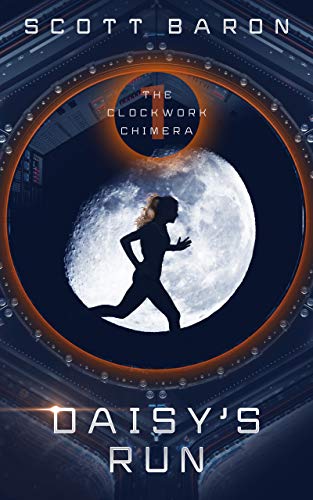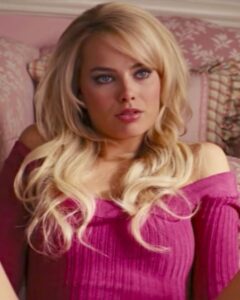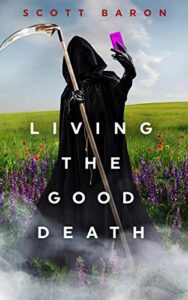
Daisy’s Run: The Clockwork Chimera Book 1 received a 4+ star review, making it an IndieReader Approved title.
Following find an interview with author Scott Baron.
What is the name of the book and when was it published?
Daisy’s Run: The Clockwork Chimera Book 1; Published November 15, 2018
What’s the book’s first line?
“Should we wake them? I mean, the ship is on fire, after all.”
What’s the book about? Give us the “pitch”.
Daisy’s Run is the story of a snarky 20-something who finds herself desperately trying to discern who is threatening her flight home to Earth after she’s abruptly awakened from a cryogenic stasis still many months from home. However, that’s not as easy as it sounds as she’s stuck in deep space aboard a damaged ship piloted by an unusual AI and crewed by an odd cyborg and a group of mechanically-enhanced humans.
What inspired you to write the book? A particular person? An event?
The idea for the book was originally intended to be an exciting sci-fi novella with the aim to make it into a graphic novel. As I began outlining where I wanted to go with the characters, the story took on a bit of a life of its own, expanding from a novella to five full-sized novels.
What’s the main reason someone should really read this book?
Fans of snarky banter, sneaky artificial intelligence, oddball cyborgs, and a little bit of outer space romance to boot will likely enjoy the fast-paced and fun feel of this space adventure.
What’s the most distinctive thing about the main character? Who-real or fictional-would you say the character reminds you of?
Daisy Swarthmore is a flawed protagonist, but not one you hate. She harbors a prejudice against mechanically-altered humans, as well as all forms of AI. Living on a ship crewed by precisely those types can lead to a reexamining of one’s values. At the same time, she’s also forced to play detective among those people, figuring out what is a real threat versus a simple misunderstanding. It makes her tough, yet vulnerable, and at times even a bit paranoid. She’s a fun character and really grows over the life of the series.
If they made your book into a movie, who would you like to see play the main character(s)?
I had thought perhaps Genevieve Angelson or Margot Robbie could bring the strength but also vulnerability to the character of Daisy. Gina Torres would be an amazing Tamara, and Peter Stormare would make for an engaging Captain Harkaway.
When did you first decide to become an author?
I started writing screenplays around 2004, first with Vigor Mortis – a zombie action story – followed by a few more screen and teleplays. The urge to write books hit while I was working on a TV show in 2015. I’d been writing and rewriting the screenplay of my dark supernatural romantic comedy Living the Good Death and realized that despite doing rather well in screenwriting competitions, the story could be fleshed out so much more as a proper novel. With that impetus, I set out to convert the script to novel form, greatly expanding the story of the girl who thought she was Death. After that, I couldn’t stop. While I still work in film as my day job, it’s writing that I truly enjoy.
Is this the first book you’ve written?
No. Living the Good Death was my first full-length novel. It’s the story of a young woman who believes she is death trapped in human form. Her continued insistence on this point lands her in a mental hospital, where she befriends some very unusual characters and eventually learns to appreciate life, regardless of whether she truly is a supernatural being, or is just a crazy girl. It’s a supernatural romance, but it’s also a dark comedy.
What do you do for work when you’re not writing?
I work as an on-set medic in the film & television industry. More often than not, that means handing out Advil and sunblock and fixing occasional boo-boos. Once in a while, however, actual emergencies happen, though that has become less frequent as the film industry takes safety very seriously (most of the time).
How much time do you generally spend on your writing?
I try to get in a few hours of writing a day if I can, but working on my laptop on a movie set when we’re frequently working fifteen or more hours per day can be tough. When I’m not working things can be more intense, sometimes racking up five to ten thousand words a day.
What’s the best and the hardest part of being an indie?
I’ve found the rewards of writing what you want to be such a joy. No one telling me not to write a genre piece because of marketing considerations. That said, I have to do my own promo, pay for my own editing and cover design, and all without any guarantee a book will ever sell. It’s tough rising high enough in the rankings to be seen by new readers, especially when you don’t have the weight of a publisher behind you.
What’s a great piece of advice that you can share with fellow indie authors?
Spend the money on a good cover. That’s what makes people stop to read your blurb–which is step two. Write a good blurb. That and the cover are what will sell books. Obviously, you should strive to write a good, well-edited story, but so many skimp on the cover, which just kills your hopes of even being seen and taken seriously.
Would you go traditional if a publisher came calling? If so, why?
Depending on the offer. A traditional publisher can help you option your work for film or TV far easier than going it alone, and I’ve written my work with film adaptation specifically in mind. I think it comes from the background in screenwriting, which is why my work tends to read more ‘visually’ than some others.
Is there something in particular that motivates you?
When I get a positive review from someone who really enjoyed something I came up with, well, it’s such an incredibly rewarding feeling knowing I contributed to someone’s pleasure like that. Of course, I’d love to see my work go on to become something more and even make a living doing just this, but until that happens, hitting the sweet spot with readers from time to time is pretty kick-ass.
Which writer, living or dead, do you most admire?
There are many I enjoy, but only a few I truly admire. Neil Gaiman is one. Such wit, that man. Amy Hempel writes prose so amazing I sometimes stop mid-paragraph to re-read a particularly beautifully-crafted sentence. Kurt Vonnegut, because he was weird as hell and stayed true to his style. Some people hate him for it, but millions love him for being himself. So it goes.


